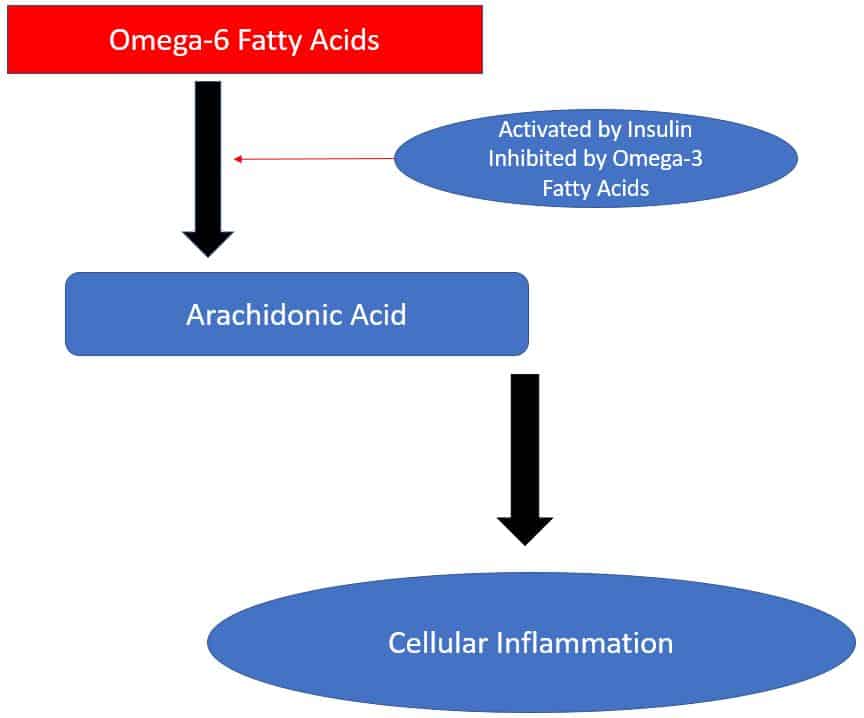Inflammation is a crucial part of normal physiology. Inflammation allows cells to heal and fight microbes. It is a complex process that starts with an inciting agent like injury, a microbe or diet. Hundreds of signals lead to acute inflammation and cellular destruction leading eventually to elimination of the inciting agent. This is typically followed by an anti-inflammatory resolution response resulting in cellular rejuvenation and healing. Chronic inflammation occurs when there is no resolution of the initial inflammatory reaction. The immune system is chronically activated at a sub-clinical level below the perception of pain and development of fever leading to cellular damage and the development of chronic diseases like obesity, diabetes and cancer.
Diet plays an important role in cellular inflammation. Omega-3 fatty acids and many antioxidants like polyphenols decrease inflammation. Saturated fats, omega-6 fatty acids and refined carbohydrates, on the other hand, increase inflammation. Linoleic acid, a poly-unsaturated omega-6 fatty acids is metabolized to arachidonic acid which in turn leads to the formation of several leukotrienes and prostaglandins. The latter are pro-inflammatory eicosanoids that, when left unchecked, result in chronic inflammation and cell damage. Linoleic acid is present in processed vegetable oil made from corn, sunflower, and safflower. Vegetable oil has found its way to almost every processed food item you encounter on your grocery store shelves. Interestingly, insulin promotes the conversion of linoleic acid to arachidonic acid. Insulin is increased by excessive refined carbohydrate consumption like white flour and sugar. These high glycemic food items constitute a large portion of our modern diet. A doughnut for example is a mixture of saturated fats, linoleic acid and refined carbohydrates and the perfect recipe to induce inflammation in the body. A doughnut increases insulin levels due to its high content of white sugar and flour. Insulin then promotes the conversion of linoleic acid (the oil used to fry the doughnut) to arachidonic acid which in turn promotes inflammation. Sardines on the other hand are rich in omega-3 fatty acids, and low in saturated fat and cholesterol. Sardines do not contain any refined carbohydrates and are rich in vitamins and minerals. Sardines are therefore the perfect example of a food item that you ought to incorporate in your diet to prevent obesity, diabetes and cancer. Multiple studies have shown that a Mediterranean diet rich in olive oil, fish, and nuts while low on red meats and refined carbohydrates is one of the healthiest diet to follow. People around the world who follow this kind of a diet live longer and healthier.
J Prescott et al published a study in 2014 in the British Medical Journal on the effect of the Mediterranean diet on Telomere length. 121700 subjects have been followed since 1976. Individuals with greater adherence to Mediterranean diet had longer telomeres. An anti-inflammatory diet like the Mediterranean diet is indeed associated with a lower rate of telomere shortening leading to healthier cells and increased longevity.
In this holiday season, whether you are trying to prevent weight gain or lose weight for the new year, try to tip the balance in your daily eating habits towards an anti-inflammatory diet. Detox your body by avoiding the refined carbohydrates and oils that plague our modern food supply. Replace red meat and processed vegetable oil with fish and extra virgin olive oil. Replace dairy products like cheese and butter with nuts like walnuts and almonds. Finally avoid sugar and white flour consumption to prevent increasing insulin blood levels leading to increased inflammation and fat accumulation.

